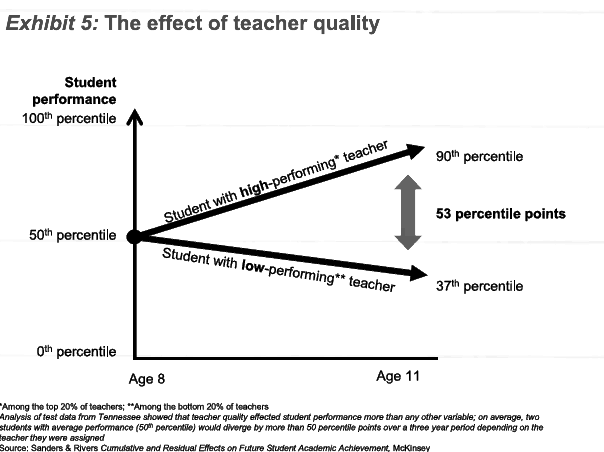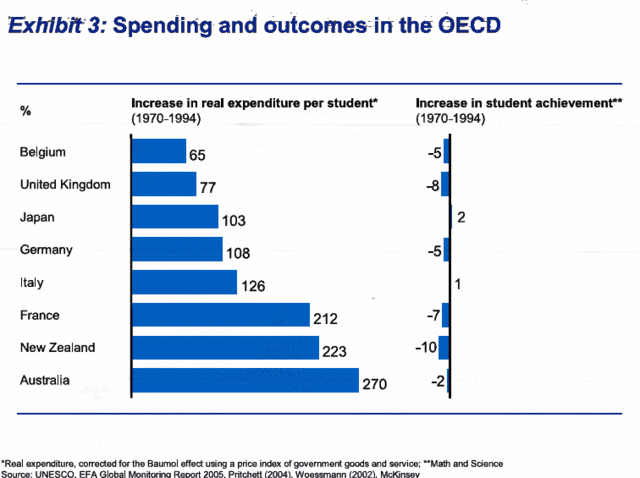"You took a teaching position, 'cause you thought it'd be fun, right?
Thought you could have summer vacations off...and then you found out it
was actually work...and that really bummed you out"
-- Carl to Vernon, in
Update May, 2015: Since Jon Stewart raised the issue of Baltimore school under-funding, we look at the salaries of Baltimore school teachers. Short answer: On a full-year basis, Baltimore teachers start at over $61,000 a year, not including generous benefits.
If you go to the NEA web site, you will see that they argue that most of the problems in education boil down to either low teacher pay or overly high teacher productivity expectations (i.e. classroom size). I fisked many of these claims here and here, but most media outlets still quote these assertions credulously when they write about education.
I have found (from some past emails I have received) that one of the ways to really irritate a teachers union rep is, when they lament their low salaries, to point out that they only work 9 months a year, and they should multiply their salaries by 1.33 to make them comparable to the rest of ours. For example, per the NEA web site, teachers made a bit over $56,000 on average in California in 2004. Lisa Snell, in this month's Reason, estimates that benefits add nearly $16,000 to this compensation package, for a total of about $72,000 per year for California teachers. Normalize this for the fact they work 9 months (or less) a year, and you get them making an equivalent of $100,000 a year. Woe is me.
Of course, California is high vs. other states on salary, and the "9 months" estimate is only approximate, and doesn't count the fact that teachers typically work a shorter work week than many other professionals. Fortunately, Snell pointed me to this article in Education Next, which has a fantastic rebuttal to the "teachers are underpaid" myth.
A substantial body of evidence implies that teachers are not underpaid
relative to other professionals. Using data on household median
earnings from the U.S. Department of Labor, I compared teachers with
seven other professional occupations: accountants, biological and life
scientists, registered nurses, social workers, lawyers and judges,
artists, and editors and reporters. Weekly pay for teachers in 2001 was
about the same (within 10 percent) as for accountants, biological and
life scientists, registered nurses, and editors and reporters, while
teachers earned significantly more than social workers and artists.
Only lawyers and judges earned significantly more than teachers"â€as one
would expect, given that the educational training to become a lawyer is
longer and more demanding.
Teachers, moreover, enjoy longer vacations and work far fewer days per
year than most professional workers. Consider data from the National
Compensation Survey of the Bureau of Labor Statistics, which computes hourly earnings
per worker. The average hourly wage for all workers in the category
"professional specialty" was $27.49 in 2000. Meanwhile,
elementary-school teachers earned $28.79 per hour; secondary-school
teachers earned $29.14 per hour; and special-education teachers earned
$29.97 per hour. The average earnings for all three categories of
teachers exceeded the average for all professional workers. Indeed, the
average hourly wage for teachers even topped that of the highest-paid
major category of workers, those whose jobs are described as
"executive, administrative, and managerial." Teachers earned more per
hour than architects, civil engineers, mechanical engineers,
statisticians, biological and life scientists, atmospheric and space
scientists, registered nurses, physical therapists, university-level
foreign-language teachers, librarians, technical writers, musicians,
artists, and editors and reporters. Note that a majority of these
occupations requires as much or even more educational training as does
K"“12 teaching.
Curious about the data she uses, I went straight to her source, which is here, and now has data through 2003 online that can be queried. Sure enough, her conclusions are right there in the Labor Department data:
| Professional or Technical Occupation |
2003 $/hr |
| Technician |
$20.85 |
| Avg. White Collar, ex. Sales |
$23.33 |
| Avg. All Professional and Technical |
$28.37 |
| Elementary School Teacher |
$31.74 |
| Executive, administrator, manager |
$32.20 |
| Engineer, architect, surveyor |
$34.34 |
| Dentist |
$38.93 |
| Lawyer |
$46.11 |
| Doctor |
$52.91 |
Note that when corrected for hours worked onto a $ per hour basis, teacher salaries are higher than the average white collar or professional worker, and quite competitive with other professionals such as engineers and managers. In fact, if you were to take out private school teachers (which mix the number lower, see below) the average for public school teachers is even higher. Occupations making more than teachers such as doctors and lawyers require much more education and long-term commitment than the average elementary school teaching role.
By the way, the Education Next article linked above gives us another clue that is useful in understanding teachers salaries: For the vast majority of professions, a government job in that profession pays less than an equivalent private job. People accept the lower government salary for a variety of reasons -- sometimes for unique work (e.g. interning with the DA as a young lawyer), sometimes for the higher benefits and more job security, and sometimes just because the jobs require fewer hours and frankly have lower performance expectations than their private equivalent. The one glaring exception to this public-private salary relationship is with teachers salaries, where the salaries of public school teachers are often as much as 50% higher than their private school equivalents.
Wow! Its no wonder that the NEA hates the idea of school choice and competition from private schools. They have built a public employment gravy train, with premium salaries, no real penalty for under-performance, and double digit raises for a 180 day a year job -- all while selling the media on their woe-is-me-we-are-underpaid myth.
Correction: Messed up the Breakfast Club quote - it was spoken from Carl the Janitor to Vernon, not by "Carl Vernon".
Update: A lot of people ask "What do you have against teachers?" and I answer, "nothing." I can't remember complaining about what any employee of a private firm makes. In fact, for employees of private firms, I am happy to root for you to get all you can. Go for it. But teachers are not private employees -- they are government workers, just like every other government bureaucrat who gets paid by my taxes that are taken from me against my will. If I pay your salary, and in particular if I pay your salary against my will, you can be sure I am going to demand accountability.
By the way, I send my son to a private junior high. The school is widely acknowledged to do a much better job than any public school in the city. And you know what - my tuition at this school is $2000 per year LESS than the average per pupil spending in Scottsdale public junior high schools. And this school is 100% tuition supported (it is a for profit secular institution so it can't take contributions) and it turns a profit for the family that owns it. You know how many principals, assistant principals, administrators, and clerks it has for a 300 person junior high school? Two. The number at a similarly sized public school would be ten times as high. At least.


